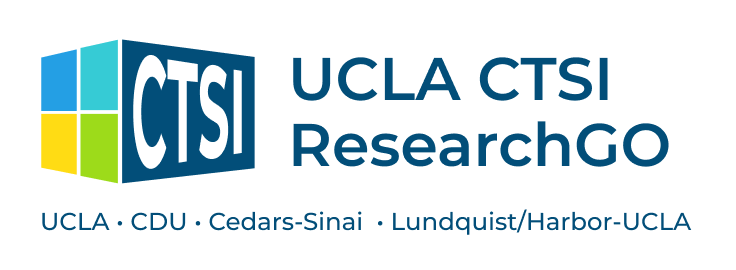UCLA is committed to supporting the research efforts of the UCLA investigator community through various training efforts. This section contains information on recommended and required trainings for new and experienced researchers.
We recommend that Investigators who are new to UCLA visit the following links for general institutional training guidance.
- Recommended Training-UCLA training resources for investigators
- CTSI New Investigator Programs-CTSI new investigator programs
- UCLA Environmental Health & Safety Training Schedule-Safety training requirements for research
- Responsible Conduct of Research (RCR)-Training and information
-
Guidance and Resources for New Investigators - Courses & Descriptions
CITI Good Clinical Practice Modules are described below - http://www.citiprogram.org
- CITI: FDA Regulated Research and ICH for Investigators - Addresses responsibilities of investigators, IRBs, and sponsors when they participate in a study of an FDA-regulated product.
- CITI: Conducting Investigator-Initiated Studies According to FDA Regulations and GCP - Describes the role of sponsor-investigator, help determine whether an IND or IDE is required for your study, and indicate what documentation is required by the FDA.
- CITI: Investigator Obligations in FDA-Regulated Clinical Research - Describes the commitments and obligations that investigators assume when participating in clinical investigations; to subjects, IRB, sponsor organization, and the FDA
- CITI: Managing Investigational Agents According to GCP Requirements - Describes the responsibilities of investigators when using investigational products according to GCP standards.
- CITI: Overview of U.S.FDA Regulations for Medical Devices - Describes the differences of research regulatory requirements for various classes and categories of devices.
- CITI: Reporting Serious Adverse Events - Identify criteria for reporting serious adverse events (SAEs) to regulatory agencies and defines serious and unexpected events which require immediate reporting.
- CITI: Audits and Inspections in Clinical Trials - Identifies different entities that can inspect or audit a clinical trial investigator and factors that determine whether an investigator will be audited
Human Subjects Training
Clinical Research Training
FDA Training and Continuing Education Resource Page Co-sponsored by FDA's CDER, Office of medical Policy and the Duke University School of Medicine. Good Clinical Practice (GCP) Key Topics by Jean Toth-Allen, PhD Investigator Responsibilities-Regulation and Clinical Trials by Cynthia F. Kleppinger, M.D. Safety assessment in Clinical Trials and Beyond by Yuliya Yasinskaya, MD, Medical Officer, Center for Drug Evaluation and Research Federal grant proposals (all proposals to NSF, training proposals for NIH) normally include a requirement that all trainees are provided with instruction in the Responsible Conduct of Research (RCR). An RCR program normally covers these areas: ethics, conflict of interest, responsible authorship, policies for handling misconduct, data management, data sharing, and policies regarding the use of human and animal subjects. The Office of Postdoctoral Affairs offers formal instruction and support to Postdoctoral Fellows in an effort to enhance the training experience at UCLA and promote successful careers in science. It is an information warehouse providing an avenue of communication among Postdoctoral Fellows, Faculty and Administrators. Research Conflicts of Interest training addresses the importance of ensuring financial interests do not affect, or appear to affect, the design, conduct of reporting of research or compromise the protection of human subjects. Additional Training for Animal Care and Environmental Health & Safety in Research is available online. See the Training tab to view the courses offered and click on the course title to view the course summary. The course title link at the top of the summary will take you into the online class. Access requires a username and password, which can also be requested online. Browse an overview of training and advancement opportunities available primarily via CTSI programs, but with an ever-increasing inclusion of other, non-CTSI opportunities. The US Department of Health and Human Services (DHHS) Office of Research Integrity (ORI) offers web-based Research Misconduct training and resources to help researchers understand the types of misconduct and how universities handle them. US Food and Drug Administration (FDA)
Training and Continuing Education
FDA Office of Good Clinical Practice-
Investigator Responsibilities
Clinical Investigator Financial Disclosures
Expanded access to and charging for investigational drugs and devices
https://fda.report/media/84996/2012-Clinical-Investigator-Course---Good-clinical-practice-%28Toth-Allen%29.pdf
Division of Good Clinical Practice Compliance
Federal regulations covering clinical research and clinical investigator obligations
Discuss specific problems seen during FDA inspections at clinical sites
Discuss various methods that can be used to ensure compliance with federal regulations and study protocol
https://cersi.umd.edu/sites/cersi.umd.edu/files/D2S07-Kleppinger-v1.pdf
Sources of safety information
Sources of safety information
Safety monitoring/ AE ascertainment·
AE Coding
Safety Reporting
Post-marketing safety (MedWatch) reporting
https://cersi.umd.edu/sites/cersi.umd.edu/files/S03%20-%2004%20Yasinskaya.pdfGood Clinical Practice
Responsible Conduct of Research
Office of Postdoctoral Affairs
Research Conflicts of Interest
Animal Care / Environmental Health & Safety
UCLA Training & Advancement Opportunities
Research Misconduct
New Tool
The Research Clinic, a Web-based interactive training video aimed at teaching clinical and social researchers how to better protect research subjects and avoid research misconduct, was recently released by the U.S. Department of Health and Human Services’ Office of Research Integrity (ORI) and Office for Human Research Protections (OHRP).
Other Tools and Useful Links
Partner Site Contacts - Training
Cedars-Sinai
- Clinical Research Professional Orientation for new hires and existing research staff. To learn more about these courses, or to enroll, contact Maggie Benton, grant and contract coordinator, 323-866-6921, maggie.benton@cshs.org.
LA BioMed
- EHR Trainings (ORCHID and i2b2 training offered by Liz Chen, Liz Chen, MBA, (310) 781-3601, lchen@labiomed.org)
Clinical Research Coordinators (SOCRA Chapter continuing education lectures; Clinical Research Coordinator Council) CTSINavigation@labiomed.org
Good Clinical Practice (CITI) Ernestina Yiadom, 310-222-3624, eyiadom@labiomed.org
